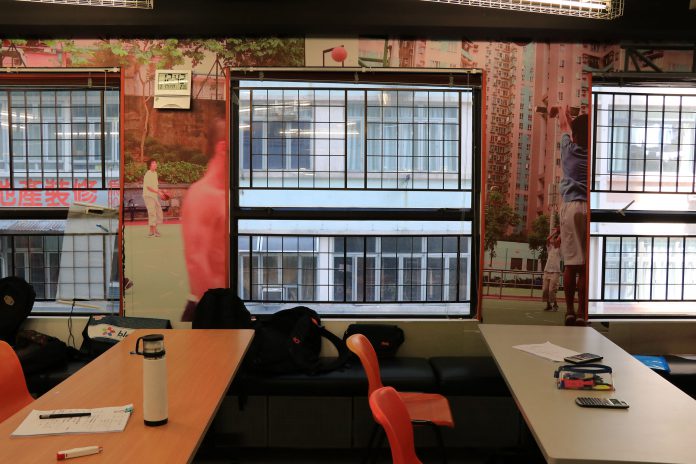School dropouts seek recognition and opportunities outside traditional education
By Crystal Wu & Yi Yeung
On a cold Saturday afternoon, a tired-looking 19-year-old takes a sip of hot tea at home in the hours between working the early shift at a restaurant and taking classes in the evening. Felix Choi dropped out of regular secondary school a year ago, and now finds himself busier than ever. He is at work from 6 a.m. to 2 p.m., takes a nap at home, then goes to evening school at 6:45 p.m. for a three-hour class.
Choi dropped out of school after repeating Secondary Four twice. He says that throughout his time in secondary school, he always knew he had no interest in study. Choi thought that studying school subjects was meaningless for his future life and all he needed to survive was a grasp of basic knowledge. So he spent minimal effort on study and planned to just coast along until his graduation from secondary school – but then he got stuck in Secondary Four.
However, while Choi dropped out of mainstream school, he never considered completely opting out of the education system altogether. This is because both he and his family believe a certificate of secondary school graduation ensures better job prospects. Evening school was preferable because it gave him an alternative way to get secondary school qualifications without having to endure the trappings of conventional school.
“Hong Kong society is certificate-oriented,” says Choi. “[Getting] the certificate represents that you have gone through your secondary school and completed a stage of your life. However much I dislike studying, I still need to finish it.”
Apart from his lack of interest in study, another challenge he faced at secondary school was the classroom environment. Choi says his class was the most disruptive one in the school. He says students in the class were playful and reckless; they were always resisting and disobeying their teachers. Meanwhile, the teachers did not provide much care and help to him and his classmates. Although he did not always agree with his classmates’ disruptive behaviour, Choi says he got along with them happily for five years.
But he was already 18 when the school asked him to repeat Form Four for a third time. His mother suggested he drop out of the school and he considered it seriously. They both agreed that staying there would be no good for Choi’s future and only waste everyone’s time.
Choi says his classmates at evening school are more mature and motivated and it has a good influence on him. “Now, studying at evening school, it feels like I’m remedying my mistakes in the past to catch up on the things I lost when I indulged in play,” says Choi.
Choi may have dropped out of regular school but he still struggles to complete his secondary education because of his belief in the need for basic qualifications, but there are others who reject this and choose a different path.
Renee Lui Hau-lam, now 17, works as a waitress in a café. She dropped out of school last October during her first semester of Secondary Five.
Lui was raised in a single parent family and her mother had high expectations for her academically from a young age. Against Lui’s wishes, her mother enrolled her in a secondary school using English as the medium of instruction although Lui had studied in a Chinese primary school. As Lui was not good at English, she found herself falling behind in secondary school.
She tried really hard to catch up but even with her best efforts she could only reach the middle level in her school. Lui felt really frustrated because she could never catch up with her competitive peers. But her mother did not understand her predicament and kept urging her to work harder. The pressure and workload increased as she progressed through the grades. Gradually she lost her interest in studying.
As the family purse strings were tight, Lui’s mother did not have the spare cash to pay for her daughter’s tutorial classes. Lui began to work part-time jobs when she was 15 to earn money for her tutorials. She got her first job in a street market where she learnt how to communicate with different people and earned the money for her tutorials herself. This gave her a sense of achievement which she had never felt from studying, so from Secondary Three onwards, Lui did different part-time jobs.
“Work gives me a greater sense of achievement, and helps me more than study does,” she says. “At least, I can take care of myself.”
Lui’s mother did not feel the same way and often scolded her for being distracted from her studies. Lui began thinking about dropping out of the school in Secondary Four. It was the prospect of taking the DSE that helped her make the final decision. Her mother was strongly opposed to it and insisted Lui should at least finish her secondary school even if she only went to school one day in a week, but Lui was determined to quit the system. After a huge quarrel, she dropped out of the school and moved out of their home.
Lui admits it may be difficult for her to look for jobs, but she says she does not regret her decision and she has no plans to take any vocational courses. “You can never define whether a person is good or bad by his certificate. To study or not won’t make a difference to my life,” Lui says. “I have a job for now. I don’t care what other people think.”

Karmen Yan Ka-lai is proof that dropouts can find success. The 22-year-old is an entrepreneur who has built her online wine-selling business from scratch. But it was a struggle getting to where she is now. She dipped in and out of the education system several times before starting her own business with the help of a Government Grant Loan Scheme.
Yan was born in Macau and came to Hong Kong when she was 14. As she could not get accustomed to the pace of study and the rigid teaching model, she began skipping school under the pretence of sickness.
When Yan was 16, her teachers and family found she had no interest in study, so they sent her on a two-week vocational interest class organised by a community centre. Yan found she enjoyed the training more than she did traditional education, so she dropped out of school. She enrolled on courses run by the Vocational Training Council (VTC) instead and underwent further vocational training in the VTC’s Youth College for three years. Although her parents were opposed to this and maintained that a traditional education would ensure her a brighter future, they gave in in the face of Yan’s resolve.
Despite the more the relaxed teaching style in vocational school, Yan says she was discriminated against and excluded by her peers for taking her work seriously. Although it was a dark period for her, she thinks these experiences taught her life lessons she would never have learned in traditional schools.
Through hard work and perseverance, Yan managed to enter a design school in 2015. At around the same time, she started an online winery business with a friend and got financial support from a grant loan.
Life looked bright and Yan’s family had high expectations, but trouble flared again when she chose what turned out to be the wrong course – Exhibition Design. The heavy workload made her depressed and she cried every night.
At that point, Yan dropped out again to concentrate on her business. However, the business closed down several months later because of a difference of opinion between her and her business partner. It was a huge blow, but with the help of some friends and mentors she finally decided to rebuild her own wine-selling business.
“It feels like I have tumbled to the bottom of my life and stood up from the trough repeatedly,” Yan concludes. “But I have never had any regrets since choosing this path.”
While dropouts struggle both in and out of the system, some organisations, like Unusual Academy, seek to help them. Founded in 1996, the organisation has worked with youths to help them find their direction in life. Social workers provide services from life skills training activities to stamina training workshops that are tailored to individual young people’s specific needs. The latter includes hiking, camping, rock climbing and night walks. Through volunteer service, pre-vocational training and interest classes, the training helps school dropouts to discover their interests and prepare them to go back to school or enter the workplace.

Christine Cheung Yeuk-Yip, who has worked as an outreach social worker since 1996, is the principal of Unusual Academy. Cheung is critical of society’s negative view of school dropouts. She says they are seen as lazy, bad, aimless, lacking in confidence and having poor relationships with people.
However, Cheung thinks this is unfair. “[Society] only sees the presenting problems of the dropouts, but neglects their underlying needs,” she says. She explains there are different factors that cause young people to drop out, including their peers, school, family, and personal circumstances. Most dropouts find no attachment to their school, family or peer groups, adds Cheung. “What we are doing is to fulfill their underlying needs and teach them a proper way to express themselves.”
Cheung recounts the struggles that she and her colleagues face in trying to help enroll students back into schools and ask employers to give these young people a chance. “There are very few chances; we hope society can give more opportunities to these teenagers.”
According to Steven Ho Lap-him, 33, a social worker at Unusual Academy, it is “the system that beats down students”. Under Hong Kong’s education system, academic achievement is the only measure of a student’s achievement and worth. He says society needs a system that accepts different people are suited to different pursuits. However, Ho sees a far bigger problem beyond the education system.
“It is not [just] the problem of the system itself, but of how people execute and perceive this system,” Ho says. The problem is that Hong Kong people have very traditional mindsets and believe formal education is the best path for every child.
“[Dropping out of school] could be a transfer station for [young people] to explore different options in their lives. I believe people will have this mindset one day,” says Ho.
Edited by: Lynette Zhang











































